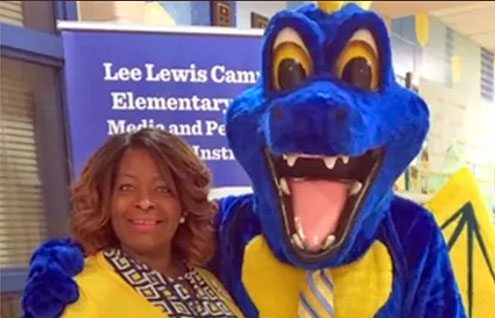Dragon Leader Sharon Holmes
 My hope and dream is to forever make a difference in a young person's life, not only to touch the mind, but also to touch their heart as well.
My hope and dream is to forever make a difference in a young person's life, not only to touch the mind, but also to touch their heart as well.
I am a native Austinite and a product of Austin I.S.D. I attended Blackshear Elementary, Maplewood Elementary School, Lamar Jr. High, and Stephen F. Austin High School.
I graduated from Texas State with a B.S. in Interdisciplinary Studies, and a minor in Reading. I also hold a Master's in Educational Administration, along with a Counseling Certification from Region 13 Educational Service Center.
I provide:
- Classroom Guidance Lessons
- Individual Planning
- Responsive Services
- System Support
- Social Emotional Learning
- No Place for Hate Coalition
- Parent Education
- Leadership
- 504 Campus Coordinator Services
- Advanced Academics Services (I'm a Gifted and Talented Advocate)
Counselor FAQs
What is the role of the school counselor?
The role of the school counselor is to help all students at their local campus fully develop academic, career, personal and social abilities. The counselor is an educator who delivers a comprehensive guidance program in the school as recommended by the Texas Education Agency (TEA).
Why contact a school counselor?
I can assist a student with:
- Transition to a new school,
- The registration process and orientation,
- Academic achievement concerns,
- Post-secondary plans (college, technical school, financial aid),
- Standardized test interpretation
- Special personal needs,
- Crisis situations,
- Family transitions (i.e. death, divorce, re-marriage, new sibling, etc.)
What does a school counselor do?
Depending on the grade levels being served, a counselor coordinates the development of a comprehensive guidance plan based on campus needs, teaches classroom guidance lessons to all students, counsels with students individually and/or in groups, assists students in crisis situations, helps to identify individual student needs, refers students and/or parents to services and agencies outside the school, conducts conferences with parents, links students with school and community resources through the campus Child Study Team, including the SSS’s, Communities in Schools and other agencies, advises students on individual, school, college and career plans in coordination with other Student Support Services programs, analyzes test results to provide information about abilities, achievement, interests and needs, coordinates school-to-career programs, and coordinates with colleges and universities to provide information to students.
How can a student access the school counselor?
- Self-referral by student
- Teacher, administrator or staff referral
- Parent referral
- Peer referral
- Counselor observation
What is a Guidance Program?
A Comprehensive Guidance Program consists of four major areas:
- Classroom Guidance – Counselors teach classroom lessons addressing basic life-long skills identified as essential for academic and persona success. These skills include responsible behavior, conflict resolution, goal setting and career planning among others.
- Individual Planning – Counselors help students to select appropriate courses, plan for transitions (i.e., middle to high school), and provide to students and parents information on careers and post-secondary education and training.
- Responsive Services – Counselors provide students with an immediate personal concern, a crisis or a problem that may be affecting their achievement in school. The counselor may provide short-term individual sessions on in a small group with other students that face similar challenges.
- Systems Support – The school system includes many programs designed to support students. Counselors assist in the referral process of students to appropriate support programs and services provided both within the school setting and to outside agencies. System support has two components:
- Educating the staff about the Comprehensive Development Guidance and Counseling Program
- Supporting the staff with professional development, consultation and community outreach.
What are the qualifications of a school counselor?
AISD counselors are state-certified professionals with a master’s degree and a minimum of two years of classroom teaching experience. Counselors continue their professional development by attending workshops and conferences on an ongoing basis. Counselors adhere to strict ethical and legal standards in the performance of their duties.
The mission of the AISD Guidance and Counseling Department is: To implement a comprehensive developmental guidance and counseling program promoting student success through a focus on academic achievement, prevention and intervention activities, advocacy and social/emotional and career development.
